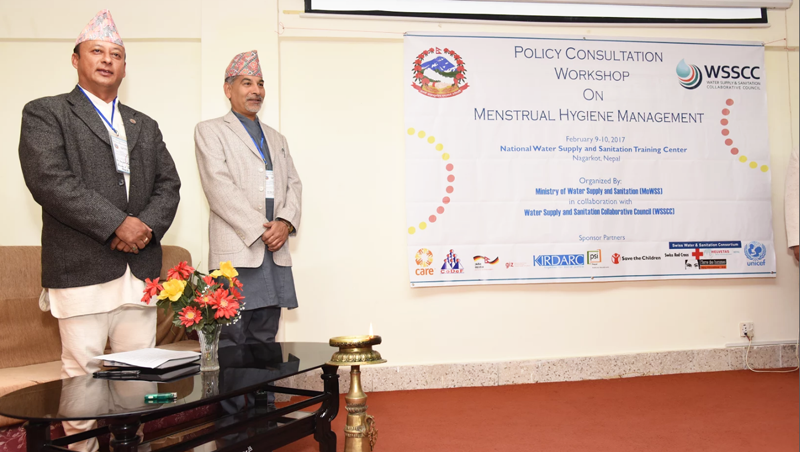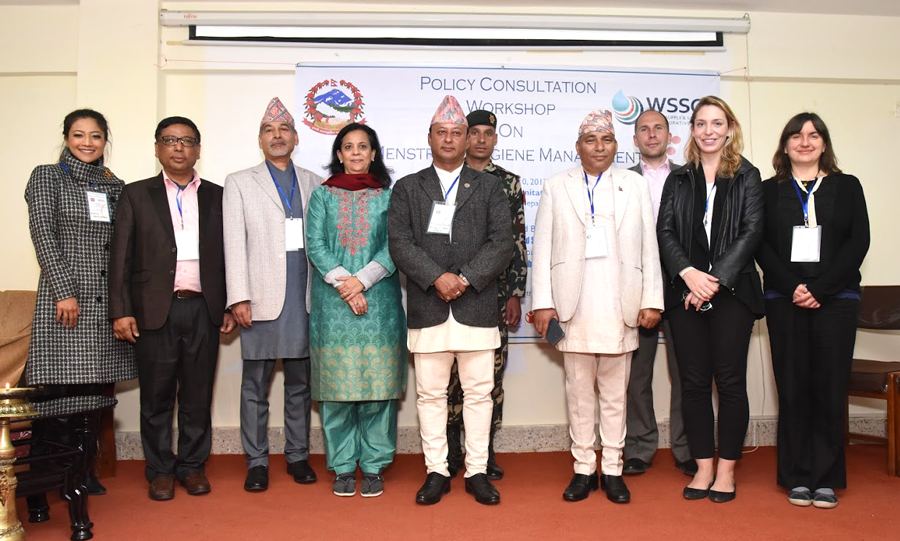
Honourable State Minister Mr. Deepak Khadka and Joint Secretary Mr. Rajan Raj Pandey of the Ministry of Water Supply and Sanitation (MoWSS) at the Policy Consultation Workshop on Menstrual Hygiene Management in Nagarkot, Nepal
The Nepalese Ministry of Water Supply and Sanitation (MoWSS), in collaboration with WSSCC has hosted a high-level Menstrual Hygiene Management (MHM) Policy Consultation workshop to initiate the development of a policy framework on MHM in Nepal.
The well-supported event served as a platform for open discussion to improve the situation of menstrual hygiene management in Nepal. Honourable Minister, Water Supply and Sanitation, HE Mr Prem Bahadur Singh and Honourable State Minister, Water Supply and Sanitation, HE Mr Deepak Khadka attended, alongside dignitaries from related ministries, representatives from civil society organizations, UN bodies, the private sector and media. Importantly, the event included able and disabled women and girls, who traveled from many parts of Nepal to share their real-life experiences and add their voices to the debate.
In his opening statement HE Mr Deepak Khadka expressed his commitment, stating that menstruation is a ’human and not a women’s issue’. “It is a manifestation of deeply embedded structural gender inequalities and therefore requires challenging the existing gender relations in our society,” he said.
Nepal has shown remarkable resilience and sustainability in its approach to safe and appropriate sanitation and hygiene, particularly in its prioritization of rebuilding sanitation facilities following the 2015 earthquake.
Yet, despite steady advances by the government between 2000 and 2015 with a 42 percentage point increase in use of sanitation, Nepal continues to face the challenge of deep-set cultural stigma towards menstruation. This manifests in the harmful practice of Chhapaudi, which prohibits girls and women from participating in normal family activities during a menstruation period, as they are considered ‘impure’. Chhaupadi was outlawed by the Supreme Court of Nepal in 2005, but the tradition has been slow to change.
During menstruation, under Chhaupadi women are kept out of the house and have to live in a cattle shed or a makeshift hut. This happens for ten to eleven days when an adolescent girl has her first period; afterwards, the duration is between four and seven days each month. In December 2016, this practice resulted in the death of a 15- year- old girl in western Nepal’s Achham district, who was overcome by smoke after lighting a fire to keep herself warm in a small cow shed.

Honourable State Minister Mr. Deepak Khadka, Joint Secretary Mr. Rajan Raj Pandey, Miss Nepal World 2015 Evana Manandhar, WSSCC Programme Manager Archana Patkar, WSSCC National Coordinator Guna Raj Shreshta and other participants at the Policy Consultation Workshop on Menstrual Hygiene Management in Nagarkot, Nepal
At the workshop, the Minister reconfirmed the government’s stance on this practice: “We intend to eradicate any Chhaupadi related tragic incidents in future through policy level intervention and implementation,” he said.
The workshop focused on developing transformative action to break the silence around menstruation, to provide appropriate sanitation and hygiene facilities for men and women at all stages of their lives, both abled and disabled and, importantly, to address the management of menstrual waste, allowing for safety and dignity. The workshop allowed for lively interaction, opening space for learning, sharing and collaboration.
Honourable Minister, HE Mr Prem Bahadur Singh, expressed the commitment of the government of Nepal (full speech available here):
“I assure you that a policy framework for MHM will be formulated based on the outcome and suggestions of this workshop and we intend to bring it into action as soon as possible,” he said.
“We will further work with the Ministry of Health, Ministry of Education, Ministry of Environment, Ministry of Local Development and Federal Affairs, Ministry of Women and Children and WASH development partners to harmonize the menstrual hygiene policy and monitoring of implementation of the menstrual hygiene programme and projects,” he continued.
Outlining the practical actions to address this commitment, MOWSS Joint Secretary, Mr Rajan Pandey said that going forwards, there will be no Open Defecation Free status without MHM in Nepal.
In her keynote speech, Archana Patkar, WSSCC’s Programme Manager for Policy and Advocacy applauded the government for its continued support for sanitation and hygiene as the foundation for the wellbeing of Nepali citizens, and particularly its budgeting of initiatives for diversity and inclusion and WASH in special situations, leaving no one behind.
“I am convinced that Nepal will transform the lives of its 14 million plus women and girls through transformative policies and matching actions on the ground—providing leadership and inspiration for South Asia – and indeed the entire planet,“ she said.
WSSCC extends its thanks to its National Coordinator Guna Raj Shreshta who spearheaded the initiative, and the Community Development Forum (CODEF) team who facilitated the workshop. Mr Shreshta has championed the cause of MHM in Nepal. His closing speech is available here.
WSSCC also thanks Master of Ceremonies Evana Manandhar, Miss Nepal World 2015, who is an ambassador for WSSCC on menstrual hygiene and other equality and non-discrimination issues.
Source: WSSCC

